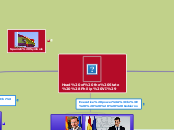arabera Ricardo Bragado 7 years ago
721
The political organization of Spain

arabera Ricardo Bragado 7 years ago
721

Honelako gehiago
Section 113
Section 114
Section 4
1. The flag of Spain consists of three horizontal
stripes: red, yellow and red, the yellow
stripe being twice as wide as each red stripe.
2. The Statutes may recognize flags and
ensigns of the Self-governing Communities.
These shall be used together with the flag of
Spain on their public buildings and in their official
ceremonies.
Section 69
1. The Senate is the House of territorial representation.
2. In each province, four Senators shall be
elected by the voters thereof by universal,
free, equal, direct and secret suffrage, under
the terms to be laid down by an organic act.
3. In the insular provinces, each island or
group of islands with a Cabildo or insular
Council shall be a constituency for the purpose
of electing Senators; there shall be three
Senators for each of the major islands —Gran
Canaria, Mallorca and Tenerife— and one for
each of the following islands or groups of islands:
Ibiza-Formentera, Menorca, Fuerteventura,
Gomera, Hierro, Lanzarote and La Palma.
4. The cities of Ceuta and Melilla shall
elect two Senators each.
5. The Self-governing Communities shall,
in addition, appoint one Senator and a further
Senator for every million inhabitants in their
respective territories. The appointment shall
be incumbent upon the Legislative Assembly
or, in default thereof, upon the Self-governing
Community’s highest corporate body as provided
for by its Statute which shall, in any case,
guarantee adequate proportional representation.
6. The Senate is elected for four years.
The Senators’ term of office shall end four years
after their election or on the day on which
the House is dissolved.
Section 68
1. The Congress shall consist of a minimum
of three hundred and a maximum of four
hundred Members, elected by universal, free,
equal, direct and secret suffrage, under the
terms to be laid down by the law.
2. The electoral constituency is the province.
The cities of Ceuta and Melilla shall be represented
by one Member each. The total
number of Members shall be distributed in accordance
with the law, each constituency
being allotted a minimum initial representation
and the remainder being distributed in proportion
to the population.
3. The election in each constituency shall
be conducted on the basis of proportional representation.
4. The Congress is elected for four years.
The term of office of Members thereof ends
four years after their election or on the day on
which the Congress is dissolved.
5. All Spaniards entitled to the full exercise
of their political rights shall be electors and
may be elected.
The law shall recognise and the State
shall facilitate the exercise of the right of
vote by Spaniards who are outside Spanish
territory.
6. Elections shall take place between thirty
and sixty days after the end of the previous
term of office. The Congress so elected must
be convened within twenty-five days following
the holding of elections.